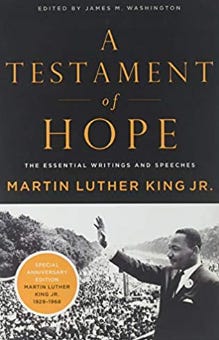9 Truths MLK Taught Us About Nonviolence and Love
On a day we dedicate to King’s memory, let us remember the most important lessons he taught.
We live in strange times. I understand, finally, what Dickens meant when he wrote in A Tale of Two Cities:
It was the best of times, it was the worst of times, it was the age of wisdom, it was the age of foolishness, it was the epoch of belief, it was the epoch of incredulity, it was the season of Light, it was the season of Darkness…
On one hand, we live in an age of miracles. We have wealth that is without historical precedent and wonderful machines that our great grandfathers could not have imagined that make our lives easier. On the other hand, we live in an age of confusion and political divisiveness that threaten the bonds which hold us together.
Regarding the former, I can do little but be thankful for the peace, prosperity, and opportunities I’ve received (as should we all). Regarding the latter, I won’t claim here to know the answer to our challenges. But I have no hesitation to say what the answer is not: force.
Many today, we’ve seen, feel so righteous in their cause they’d resort to violence and intimidation to achieve their desired ends. Such thinking is mistaken, and Dickens’s great tale shows us where it leads. There’s a better way, one Martin Luther King Jr. (1929-1968) was brave and wise enough to show us.
On a day we dedicate to King’s memory, let us remember the most important lessons he taught and any human can receive. Here are nine things MLK taught us about nonviolence and love:
1. “We must come to see that the end we seek is a society at peace with itself, a society that can live with its conscience. And that will be a day not of the white man, not of the black man. That will be the day of man as man.” – “How Long, Not Long,” 1965
2. “If you have weapons, take them home; if you do not have them, please do not seek to get them. We cannot solve this problem through retaliatory violence.” – Stride Toward Freedom, 1958
3. “Hate cannot drive out hate; only love can do that. Hate multiplies hate, violence multiplies violence, and toughness multiplies toughness in a descending spiral of destruction.” – “Loving Your Enemies,” 1957
4. “Love is the most durable power in the world. This creative force, so beautifully exemplified in the life of our Christ, is the most potent instrument available in mankind's quest for peace and security.” – “Loving Your Enemies,” 1957
5. “In spite of temporary victories, violence never brings permanent peace. It solves no social problem; it merely creates new and more complicated ones.” – “Three Ways of Meeting Oppression,” 1958
6. “The hope of a secure and livable world lies with disciplined nonconformists, who are dedicated to justice, peace, and brotherhood.” – Strength to Love, 1963
7. “Nonviolence is the answer to the crucial political and moral questions of our time—the need for mankind to overcome oppression and violence without resorting to violence and oppression. Civilization and violence are antithetical concepts.” – Nobel Prize acceptance speech, 1964
8. “We will not build a peaceful world by following a negative path. It is not enough to say 'We must not wage war.' It is necessary to love peace and sacrifice for it. We must concentrate not merely on the negative expulsion of war, but on the positive affirmation of peace.” – “The Quest for Peace and Justice,” 1964
9. “You need not now bow to hate, you need not now bow to violence, for you have now discovered another way and another approach. It comes to us from the long Christian tradition, Jesus of Nazareth himself, coming down through Mahatma Gandhi of India, who took the love ethic of Jesus Christ and made it effective as a sociopolitical force and brought about the transformation of a great nation and achieved freedom for his people.” – Founders Day Address at Sisters Chapel, Spelman College, 1960






